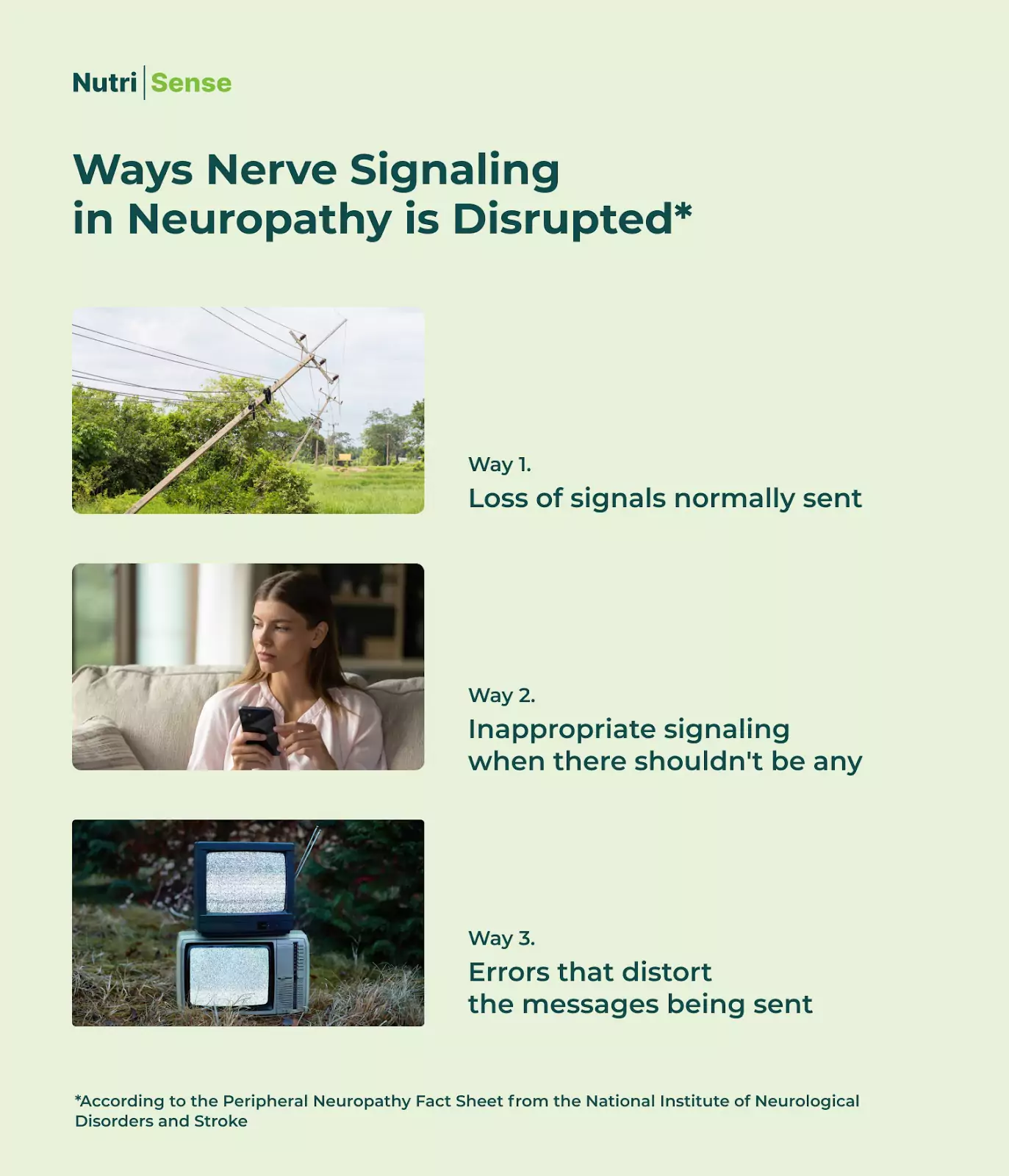What You Need to Know About Neuropathy

Key Takeaways
Did you know that one in three people will suffer from some form of neuropathy during their lifetime? Neuropathy is when you have damaged, compressed, or defective nerves.
Depending on the type of nerves and the type of damage, you may have one of five types of neuropathy:
1) Peripheral Neuropathy: This is the most common type and results from damage to the peripheral nervous system.
2) Proximal Neuropathy: It occurs when you have nerve damage in areas like your thighs and hips.
3) Cranial Neuropathy: Your cranial nerves are nerves that travel from your brain and affect certain areas in your face. Cranial neuropathy includes conditions like Bell’s palsy.
4) Autonomic Neuropathy: A neuropathy that affects the involuntary nervous system like your digestion, heart, and circulation.
5) Focal Neuropathy: This is the least common type, sometimes known as mononeuropathy. It affects a single nerve and can happen in your foot, wrist, thigh, back, neck— even your eye muscles!
Neuropathy can be a debilitating condition, but most people can manage their symptoms and live relatively normal lives with proper treatment. Read on to learn more about neuropathy, the different types, causes, and some management techniques.
What Is Neuropathy?

First, let’s understand a little more about neuropathy. Neuropathy is a generic term for a variety of conditions that damage your nervous system. It’s a condition that occurs when you have any form of nerve damage.
As you may remember from our article about the warning signs of nerve damage, it can cause a wide range of symptoms, including pain, numbness, and weakness.
The causes of neuropathy range from autoimmune diseases and health conditions like diabetes, injuries, complications from splints, and toxins. Treatment for neuropathy often includes pain relievers, anti-inflammatories, and antidepressants.
It can result in various symptoms, depending on which nerves are affected. While neuropathy can occur at any age, it is more common in older adults. The good news is that various treatments and management techniques can help people with the condition improve their quality of life.
Some Common Types of Neuropathy
There are many different types of neuropathy, but they all share one common symptom: damage to the nerves. While it can be due to injury or disease, it can also result from damage to the nerves themselves.
This damage can occur due to prolonged exposure to certain chemicals or toxins, repetitive motions, or even diabetes. This damage can cause a wide range of problems, from mild tingling to severe pain. In some cases, neuropathy can lead to paralysis.
Neuropathy can be complex and further divided into different types based on the causes. Diabetes, for example, is one of the most common causes. Diabetic neuropathy affects up to 50 percent of people with diabetes. It can cause a range of symptoms, from numbness and tingling in the extremities to pain and weakness, and affect various parts of your body.
Peripheral neuropathy is sometimes used as a catchall term for neuropathy because it includes such a varied range of nerves, leads to many conditions, and has many causes. The peripheral nervous system consists of the nerves that send signals from the brain and spinal cord to the rest of the body.

There are three types of nerves in the peripheral nervous system: sensory, motor, and autonomic. The nervous system consists of the brain, spinal cord, and nerves.
Peripheral neuropathy can include:
1) Mononeuropathy (when it affects a single peripheral nerve)
2) Multiple mononeuropathy (two or more nerves), and
3) Polyneuropathy (when it affects many nerves)
Other conditions resulting from neuropathy include carpal tunnel syndrome, where compression of the median nerve leads to pain and weakness in the hand and wrist, and multiple sclerosis, an autoimmune disease that attacks the Myelin sheath surrounding nerve cells.
More About Your Peripheral Nerves

Since peripheral neuropathy is one of the most common types of neuropathy, you may benefit from learning a little more about your peripheral nervous system.
First, there are three types of peripheral nerves: motor, sensory, and autonomic.
1) Motor nerves send signals from the brain to the muscles, telling them to move.
2) Sensory nerves send information from the body to the brain, such as when we feel pain or touch.
3) Autonomic nerves control involuntary body functions, such as our heart rate and digestion.
Each type of peripheral nerve has a different function, but they all work together to keep your body functioning correctly. When one type of peripheral nerve is damaged, it can cause problems with movement, sensation, or involuntary body functions. That’s why it’s so important to watch for signs of damage and see a doctor without delay if you think you have any nerve pain.
According to the Peripheral Neuropathy Fact Sheet from the NIH’s National Institute of Neurological Disorders and Stroke, more than 20 million people in the United States have been estimated to have some form of peripheral neuropathy.

Ways Nerve Signaling in Neuropathy is Disrupted*
- Loss of signals normally sent (like a broken wire)
- Inappropriate signaling when there shouldn’t be any (like static on a telephone line)
- Errors that distort the messages being sent (like a wavy television picture)
*According to the Peripheral Neuropathy Fact Sheet from the National Institute of Neurological Disorders and Stroke
What Does Nerve Pain Feel Like?
The exact sensations resulting from nerve pain will vary from person to person and may change over time. However, neuropathy is typically a progressive condition, meaning symptoms will worsen over time.
Some people with neuropathy may experience a pins-and-needles sensation, while others may feel a burning or tingling sensation. In some cases, neuropathy can cause numbness, muscle weakness, muscle twitching, or loss of sensation. It can also cause problems with balance and coordination.
If you think your nerve pain is getting worse over time, it's essential to speak to a doctor so that you can diagnose and treat any nerve damage before it causes further complications.
How to Diagnose Nerve Damage

Nerve damage does not always lead to neuropathy. When diagnosing neuropathy, doctors will first take a medical history and ask about any symptoms that might be present in different parts of the body like muscle weakness, neuropathic pain, muscle twitching, sensitivity to light touch, and constipation.
Your healthcare provider will also perform a physical examination, looking for signs of nerve damage like loss of muscle strength or mobility. They may also order a skin biopsy or blood tests to look for underlying conditions causing the nerve damage.
In some cases, your doctor may order nerve stimulation tests (also known as nerve conduction studies) to test nerve function. You may also have to undergo imaging tests such as an MRI, electromyography, or CT scan. These can help rule out other conditions and give a more detailed look at the nerves themselves. Once you have a neuropathy diagnosis, treatment can begin.
Health Conditions That Can Lead to Neuropathy
- Diabetes is one of the most common causes of neuropathy. Approximately 50 percent of those who suffer from diabetes experience this condition.
- Cancer can lead to neuropathy. Tumors that develop can press on nerve fibers and nerves and cause the condition.
- Kidney, liver, and thyroid disorders like rheumatoid arthritis cause neuropathy.
- Ulcers can lead to nerve pain that causes the disorder.
- Infections like Lyme disease, shingles, sexually transmitted diseases, and leprosy have been linked to neuropathy.
- Exposure to heavy metals can lead to a higher risk of multiple health conditions, including neuropathy. Lead and mercury are two of the most common causes.
Inherited Diseases That Lead to Neuropathy
- Hereditary neuropathy with pressure palsies (HNPP) is an inherited condition that leads to peripheral neuropathy.
- Charcot-Marie-Tooth disease is the most common hereditary motor neuropathy and sensory neuropathy passed down through families.
Can You Prevent Neuropathy?
Can neuropathy be prevented? It's a difficult question to answer definitively because there are many causes of neuropathy. For example, neuropathy can be caused by diabetes, hereditary factors, vitamin deficiencies, and physical trauma. Some neuropathy causes are beyond our control, but there are still steps that we can take to reduce our risk.
For example, maintaining tight control of blood sugar levels can help to prevent diabetic neuropathy. People who work with harmful chemicals should avoid contact with their skin or eyes. And people who engage in repetitive motions should take breaks often to rest their muscles and joints.
Eating a healthy diet and taking supplements can help to prevent vitamin deficiencies that lead to neuropathy. Finally, avoiding excessive alcohol consumption and practicing safe sex can help to reduce the risk factors for neuropathic conditions caused by liver disease and HIV/AIDS.
Managing and Treating Neuropathy

There are many common causes of peripheral neuropathy, and it can be challenging to manage the condition effectively. However, there are some steps that people can take to improve their quality of life.
In some cases, neuropathy is caused by an underlying medical condition, so treating that condition can help to improve nerve function.
In other cases, neuropathy may result from damage to the nervous system. Here, treatments typically focus on pain management techniques.
There are a variety of medications that can be used to treat neuropathy. Two of the most common medicines used topically and via injection are lidocaine and capsaicin. Many people also find relief through physical therapy or acupuncture.
While there is no cure for neuropathy, there are ways to manage the condition and relieve symptoms. The first step is to identify the underlying cause of the neuropathy. If diabetes is the cause, controlling your blood sugar levels can help to prevent further nerve damage.
If medications are the cause, switching to a different medication may be an option. In some cases, physical therapy or massage can help to relieve pain and improve movement. Some doctors will also recommend over-the-counter medications to relieve symptoms.
The best way to manage a condition like neuropathy is to consult your doctor to find a suitable treatment plan for your specific needs.
What is a Typical Treatment Plan?

Treatment for neuropathy focuses on relieving the condition's underlying cause and managing symptoms. It may require medication, surgery, or lifestyle changes in some cases. While there is no cure for neuropathy, specific treatments can help manage the symptoms.
Medications used to treat neuropathy include pain relievers, anti-seizure drugs, and antidepressants. In some cases, surgery may be necessary to relieve pressure on or correct damage to the nerves.
You can also manage some of your symptoms by making lifestyle changes, such as quitting smoking, eating a healthy diet, and exercising regularly, but within your abilities.
Living with neuropathy can also be challenging mentally. Consider joining (or starting!) a support group like those listed with the Foundation for Peripheral Neuropathy, talking to friends and family, and consulting with a mental health professional.
Find the right Nutrisense programto turn insight into progress.
Go Beyond Glucose Data with Nutrisense
Your glucose can significantly impact how your body feels and functions. That’s why stable levels are an important factor in supporting overall wellbeing. But viewing glucose isn't enough. Nutrisense, you’ll be able to learn how to use your body's data to make informed lifestyle choices that support healthy living.
One-to-one coaching
Sign up to access insurance-covered video calls to work with a glucose expert: a personal registered dietitian or certified nutritionist who will help tailor your lifestyle and diet to your goals.
Monitor and measure what matters
With the Nutrisense CGM Program, you can monitor your glucose with health tech like glucose biosensors and continuous glucose monitor (CGM)s, and analyze the trends over time with the Nutrisense App. This will help you make the most informed choices about the foods you consume and their impact on your health.
Find your best fit
Ready to take the first step? Start with our quiz to find the right Nutrisense program to help you take control.

Carlee's training at Western Illinois University and an internship at the Memphis VA Hospital lead her to a career in outpatient counseling and bariatric nutrition therapy. In these positions, Carlee realized many of the disease states (upwards of 80%!) her patients experienced were actually preventable. She knew she had to dig deeper into preventative health and has since been passionate about helping people translate this complex glucose data into actionable changes anyone can implement into their everyday lives.


.webp)

